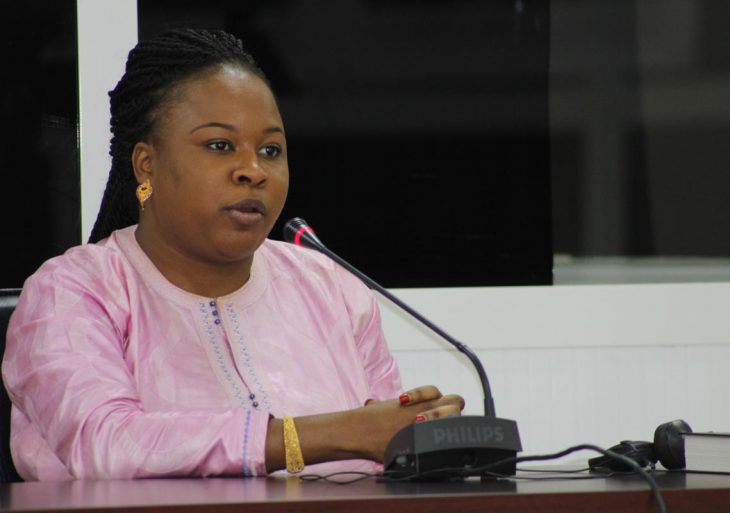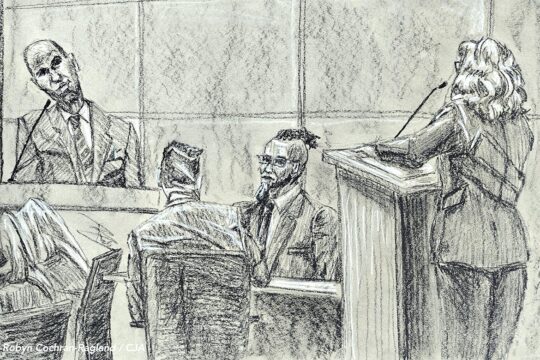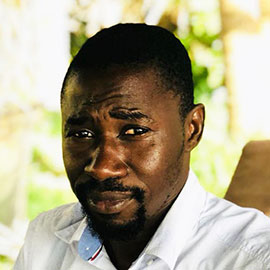Gambia’s former president Yahya Jammeh often called them the “illegitimate sons of Africa”. During his 22-year rule, his most virulent verbal attacks were against them. Last week, the “illegitimate sons” and daughters, otherwise known as journalists, had their time of attention before Gambia’s Truth, Reconciliation and Reparations Commission (TRRC).
“It has been very long and painful 22 years for journalists,” testified Saikou Jammeh, secretary general of the Gambia Press Union (GPU). “If you look at the international press freedom indexes in the world, we were doing better than only two countries at a particular point, Equatorial Guinea and Eritrea.” According to Saikou Jammeh, over 140 incidents of arrests involving journalists occurred under the military dictatorship. This means that a journalist was arrested at least every two months. These arrests involved over 60 journalists who were either tortured or illegally detained, according to GPU’s secretary general. In 22 years, Gambia recorded 15 incidents of arbitrary closure of media houses. “You just had one or two operatives of the National Intelligence Agency (NIA) walking into the newsroom and asking the media to stop operations. And they would say it is orders from the top,” Saikou Jammeh said. Over half of arrested journalists were not charged to court. It is this life as a reporter under the dictatorship that six of them came to tell before the TRRC.
Arson attacks
As Saikou Jammeh presented his findings, sitting across in the room was one of the most persecuted journalists under Yahya Jammeh’s reign, Baba Galleh Jallow. He is now the executive secretary of the TRRC and could not testify because of his position, but he was arrested multiple times and accused of not being a Gambian. His media organization The Independent was jointly owned by Alagie Yero Jallow who was also arrested multiple times. In April 2004, the newspaper’s printing press was set ablaze by people believed to be working for the state. Fearing for his safety, Baba Jallow would eventually leave the Gambia for the United States until the fall of the regime, in January 2017.
The Independent was not the only medium that suffered an arson. Saikou Jammeh said the first media house that was subjected to arson attack was Radio 1 FM in 2001. The radio station would not recover from the damage caused.
Killings and forced disappearance
As a founding member and former president of the GPU, Deyda Hydara was a strong advocate for press freedom and media professionalism. In December 2004, Gambian journalists woke up to the distressing news that Hydara had been shot, reportedly by state agents. Hydara was targeted in a drive-by shooting as he left work for his home on the night of the 13thanniversary of the establishment of The Point, the country’s first tabloid-style newspaper that he had co-founded.
Hydara was in the company of two of his staff – Ida Jagne, a typist, and Niansarang Jobe, a layout editor. Niansarang Jobe sustained wounds and was briefly admitted at hospital before she was taken to Dakar where surgery was performed on her leg and a bullet removed from her knee. Demba Ali Jawo, an equally critical journalist under Jammeh who has worked with Hydara for a number of years and wrote a book about him, told the Commission he believed Hydara was killed because of his work.
Also reportedly killed for his work was Omar Barrow, a journalist of a local radio station called Sud FM. On April 10, 2000, Barrow was shot and killed whilst reporting live from a student demonstration that had been violently suppressed by state security personnel.
Under the Gambian law, one is presumed dead if one is missing for 7 years. This is the case of Chief Ebrima Manneh, a young reporter who was arrested by NIA agents at his workplace, The Daily Observer, on July 7, 2006. He waved goodbye to his colleagues as he was being whisked away. In June 2007, the Media Foundation for West Africa filed a suit to the regional Ecowas court against the government for the enforced disappearance of Manneh. The government never appeared before the court during the hearings in Abuja, Nigeria. On June 5, 2008, the Court ordered the state of the Gambia to pay US$100,000 to the family. The Jammeh government refused to implement the decision. The payment was completed between June and November last year by the current government.
The Ecowas court made a similar ruling in the case of Deyda Hydara where the government was asked to pay a compensation of US$50,000. The Jammeh government never honored the ruling until the current government did.
Torture and exile
The TRRC institutional hearing on the media was opened by Lamin Cham, the managing editor of The Standard newspaper. Cham was arrested and tortured in two occasions. In May and June 2006, a number of journalists believed to be contributing to Freedom newspaper, including Cham, were arrested and detained. Freedom was a U.S.-based online paper very critical of Yahya Jammeh’s regime. Among the detainees was Malick Mboob, a former reporter with The Observer, a pro-government outlet he had resigned from to start working at the Royal Victoria Teaching Hospital, the country’s main referral hospital, where Jammeh’s mother had been hospitalized. Mboob was fired from his position at the hospital and arrested for allegedly leaking information to Freedom. He was held incommunicado for 137 days without being charged, before being released in October 2006.
Together with Pa Modou Faal and Musa Sheriff, who are yet to testify before the TRRC, all four journalists were reportedly subjected to torture at the NIA.
According to a research conducted by the Doha Center for Media Freedom in 2009, about 20% of the country’s practicing journalists were working in exile as of that year. Several journalists living in exile, mainly in Europe and America, would start online newspapers to challenge the regime. Through the country’s telecommunication company, Jammeh blocked access to several online sites and started going after journalists behind them. One person who reportedly fell victim of such campaign was Ndey Tapha Sosseh. The first female president of the GPU, Sosseh left to work with the West African Journalists Association in Bamako, Mali. While there, she released a statement on behalf of the GPU, indicating the Gambian government had a hand in Hydara’s death. All GPU executive members were arrested and charged with sedition. Ndey Tapha Sosseh told the TRRC that the Jammeh regime had put her on an international wanted persons list and tried to have her deported from Mali on three occasions.
“The media was the most persecuted institution under Jammeh,” concluded Lamin Cham.
TOURAY MAY GET 10 ADDITIONAL CHARGES
“The prosecution is in the process of substantially amending the indictment [against Yankuba Touray] to add at least 10 additional counts of murder and other serious offences,” said Abubacarr Tambadou, Gambia’s Minister of Justice and Attorney General at a court hearing on July 8. Touray, a former state minister under Yahya Jammeh, currently faces a single count of murder for his alleged involvement in the killing of former Finance minister Ousman Koro Ceesay in 1995. But Touray is also implicated in the killing of 11 soldiers on November 11, 1994.
He was charged two weeks ago after refusing to testify before the Truth Commission on claims that he has constitutional immunity. Tambadou asked for an adjournment until early October so that both parties can prepare as they file additional charges. The defense opposed it and asked that the current case continued. The High Court is expected to issue a decision on July 15. Touray also faces contempt of court charges for refusing to testify before the Truth Commission and that case comes on July 23.







